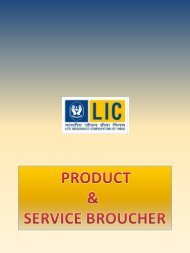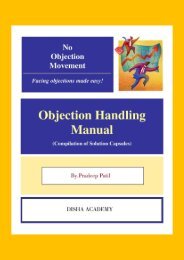INDIAN TRUST ACT 1882 BY.PRADEEP PATIL
UNDERSTANDING TRUST IN NOW A DAYS IMPORTANT FOR MARKETING FORCE OF LIFE INSURANCE
UNDERSTANDING TRUST IN NOW A DAYS IMPORTANT FOR MARKETING FORCE OF LIFE INSURANCE
You also want an ePaper? Increase the reach of your titles
YUMPU automatically turns print PDFs into web optimized ePapers that Google loves.
The trust-property is a debt outstanding on personal security. The Instrument of trust gives the<br />
trustee no discretionary power to leave the debt so outstanding. The trustee's duty is to recover<br />
the debt without unnecessary delay.<br />
The trust-property is money in the hands of one of two co-trustees. No discretionary power is<br />
given by the instrument of trust. The other co-trustee must not allow the former to retain the<br />
money for a longer period than the circumstances of the case required.<br />
13. Trustee to protect title to trust-property - A trustee is bound to maintain and defend all<br />
such suits, and (subject to the provisions of the instrument of trust) to take such others steps as,<br />
regards being had to the nature and amount or value to the trust-property, may be reasonably<br />
requisite for the preservation of the trust-property and the assertion or protection of the title<br />
thereto.<br />
The trust-property is immovable property, which has been given to the author of the trust by an<br />
unregistered instrument. Subject to the provisions of the Indian Registration Act,1877, the<br />
trustee's duty is to cause the instrument to be registered.<br />
14. Trustee not to set up title adverse to beneficiary - The trustee must not for himself of<br />
another set up or aid any title to the trust-property adverse to the interest of the beneficiary.<br />
15. Care required from trustee - A trustee is bound to deal with the trust-property as carefully<br />
as a man of ordinary prudence would deal with such property if it were his own; and, in the<br />
absence of a contract to the contrary, a trustee so dealing is not responsible for the loss,<br />
destruction or deterioration of the trust-property.<br />
Illustrations<br />
A, living in Calcutta, is a trustee for B, living in Bombay. A remits trust-funds to B by bills<br />
drawn by a person of undoubted credit in favour of the trustee as such and payable at Bombay.<br />
The bills are dishonoured. A is not bound to make good the loss.<br />
A. a trustee of leasehold property, directs the tenant to pay the rents on account of the trust to a<br />
banker B, then in credit. The rents are accordingly paid to B, and A leaves the money with B,<br />
only till wanted. Before the money is drawn out, B becomes insolvent. A, having had no reason<br />
to believe that B was in insolvent circumstances, is not bound to make good the loss.<br />
A, a trustee of two debts for B, releases one and compounds the other, in good faith and<br />
reasonably believing that it is for B's interest to do so. A is not bound to make good any loss<br />
caused thereby to B.


















